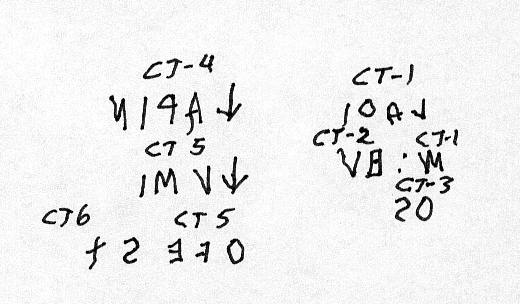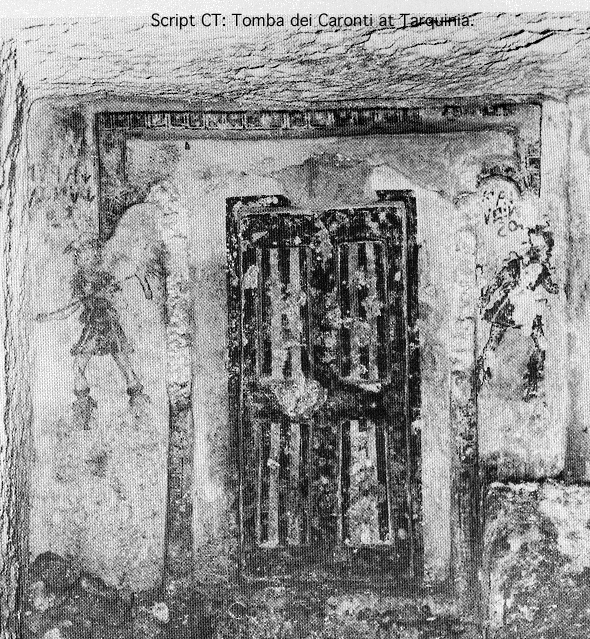To escape the frameset, if you are in it, copy URL:
http://www.maravot.com/Etruscan_Phrases_a.html
and, after deleting the current URL in the Location window,
paste the URL in the Location window and hit the return key.
You will then be able to access all pages on this site as single frames. I recommend that you stay within the frames, however.

The following is a portion of a long script and a comparative smaller script which suggests how the Etruscans viewed their "faith" in the gods and afterlife. First we examine a section of the Tavola Eugubine and compare it to script CT, a script on a tomb wall. This translation is subject to change pending the examination of other phrases in the Etruscan_Phrases.html.
AM --N241--PERSNIMY: ENV MEK: ETATV: IKV CINVS: TRIIVPER: AMa PREPHTV: (PREØTV) TRIIVPER PESNIM: Te TRIVPER ETATV: IKV CINVS ENV MEK: RINV CATVS GIMV ETATV ERA PHVNT (ØVNT): CEA GIMV: ETVTV Pe RINV CATVS; Translation: [continuing from N228]CINVS: See A--TC44-CINA. PERSNIMY/PERSNIMV, a name, possibly relating to Persephone, the goddess who descended into the Lower World/hell and is allowed to revisit the Upper World from time to time; ENV' this word declines: ENA, ENE, ENV; L. eno-are, to swim out, escape by swimming, flee; note: In Script CT, the Tomba dei Caronti at Tarquinia image, we can see a man fleeing, being chased by CHARVN (Charon, the ferryman of the Under World) who is carrying what appears to be a scythe, a long handled blade used for reaping or, as appears likely to be the case, a mattock. In Western tradition we have the vision of the "grim reaper" who carries a scythe and reaps your body at the time of death. Script CT can be opened through the lower frame or click here, Miscellaneous_Scripts.html and scroll down. CT-4 reads: KARVN KVSI RFES Te; CT-1, which is above the head of the fleeing man reads as follows: LARI Me HV OS. KVSI, L. curso-are, to run hither and thither; It. correre, v.t., to run, hurry, to flow, to be current, to circulate; Fr. Courir,'to run, to pursue, to run after, to hunt'; RFES; see also RYI, RYM, RVIYM, RYV, RVIAS [or RVIAM]; Fr. ruer, 'to fling, to hurl, to kick [chevaux], to deal [coup]; rue, f. street, thoroughfare; L. ruo, ruere, rui, rutum; fut. part. ruiturus, intransit. 'to rush down, fall, collapse, be ruined, precipitate; transf. to hurl down, also cast up'. RFES appears to be a noun since [it is hard to make out] it is followed by "Te". If the object of a verb preceeds the verb--which appears to be the rule appearing in the texts-then "Te" would be an adjective, 'your' following the word it modifies, and RFES may be 'streets'. This leaves the translation of CT-4 as follows: 'Charon he has pursued/chased your streets' but this is not probable since the word RFES would require a suffix suggesting in the streets or be preceeded by PER, 'through'. It is possible that RFES may be RvFES; L. rufus-a-um, 'red, ruddy'; It. rosso m. 'red'; Fr. rouge, m. 'red'; thus my preferred choice: "Charon he has pursued/chased you Rufus" (Rufus, the name of the person, meaning also 'red'. The next phrase, LARI Me HV OS; "Gods I have my bones/body." In any event we can see from the vision of script CT that the Etruscans viewed themselves being pursued by death and they escape to everlasting life. Many of their pottery urns show the images of the deceased "smiling at death".
With this in mind we can see how ENV MEK at AM --N241, would read, "I flee myself" ; ETATV, L. edo-edere-didi-ditum, to put forth, give out; animam.: to breathe one's last, die; clamorem, to utter. Esp. (1) to bring into the world, to bring forth, give birth to; of things: to produce (2) to make known; of writings, to publish: of ideas and information: to divulge, spread; officially, to proclaim; as legal: to fix, determine, nominate; (3) to bring about, cause, produce; of magistrates: to provide games for the people; hence, partic. editus-a-um, raised high, lofty; n. as subst. a high place, eminence'; edo-edere or esse, edi, esum, 'to eat, devour, consume, waste'; For ETA TV to be a verb and an object, such as "he produces you", it would seem that it would be written thusly: Te ETA. By comparison we have je t'aime, 'I like/love you'. See TE, Te, TV for a comparison on the use of 'Te'; also see LE, LA, Le. IKV CINVS. L. egeo-ere-ui, to want, be in need; with genit., or abl. to be in want of, to be without, not to have; also to desire, wish for, want; hence partic. egens-entis, needy, destitute; with genit., in need of'; CINVS is a word which declines: CINA, CINAS, CINE, CINI, CiNI, CINV, CINVS, CINV8 and is a frequent component of epethets in the Tavola Eugubine. Since we have seen the word also in the Tabola Cortenensis, script TC above, and the context in script TC seems "to bend down", then we would have a reading as follows: 'Persnimu, I escape myself; to the heights I am in want of'; CINVS, L. cinnis-eris, m. 'rarely', f. 'ashes'; It. 'cenere', f. ash; ashes; Fr. cendre, f. cinders, 'ash'; thus, 'I am in want of the ashes'; TRI IVPER, L. tres, tria, 'three'; iubar-oris, 'a beaming light, radiance, a heavenly body, esp. the sun'; iubeo, iubere, iussi, iussum, 'to order, to command, bid; polit., to ratify an order, hence from the perf. part. issum-i, an order, a command'; Fr. jubiler, to exult, to gloat'; (English, exult, 'to rejoice greatly, as in triumph [L. exsulto (exulto)-are, to leap up frequently or violently; transf., to rejoice exceedingly, exult, triumph; of orators, etc., to run riot, range freeely'])'; PREPHTV, L. prefor-fasri-fatus, 'dep. to speak before, to say beforehand, esp. of prayers'; divos, 'to invoke'; thus, TRIIVPER AM PREPHTV, 'Trijuber (three heavenly bodies-a god?) I love to prophesy; Trijuber Pesinimus; the hights Trijuber for you I want the ashes; I flee myself; King Cato'; GIMV, L. gemo, gemere, gemui, gemitum; intransit., 'to sigh, to groan; of lions, to roar, of doves, to coo, of things, to creak; transit. to sigh over, lament, bemoan'; It. gemmere, 'to groan, moan'; Fr. gémir, 'to lament, to bewail'; thus: ..'King Cato, of the heights/lofty I lament to; ERA, L. era-ae, f. 'mistress, lady'; PHVNT, L. fontanus, 'a spring or fountain'; It. fonte, 'spring, fountain, source'; Fr. fonte, f. 'melting, smelting, casting, cast iron, fount'; thus, ERA PHVNT, 'mistress, the source'; CEA, L. qua, 'abl. f. of qui, as adv.; relat., by which way, where, also whereby, or as far as'; P, L. per, 'prep. with acc., of space, through, along over, sometimes, before, in the presence of'; ETVTV; note the shift; thus, "Persinimus, I escape myself; in the heights I am in want of the ashes; Trijuber (three heavenly bodies-a god?) I love to prophesy;Triuber Pesinimus; the hights Trijuber for you I want the ashes; I flee myself; King Cato of the heights I lament for; mistress, the source/fountain whereby/whereof I am in want of the heights in the presence of King Cato." CATVS thus must show a prepositional relationship for the name, Cato. CINVS would therefore also reflect a prepositional relationship. The context of this phrase, therefore, has a combined message, as a prayer, that the Etruscan flees his body (os) which is in the Underworld and probably being chased. In some cases it is Erebus and in the tomb script, CT, it is Charon. Charon and Erebus are synonyms for both the Underworld and death. The Etruscans, like the Egyptians, believed in an after-life. What appears to differentiate the two faiths is that the Egyptians believed the judge of the Underworld, Osiris, represented eternal life and being in the Underworld with Osiris allowed one to be one with the god's soul which is eternal. The Etruscans seem to be showing a view that eternal life involves an escape from the chase of the Underworld. To do that they commend their os or ashes into the hands of the gods. Thus when we see the man escaping from his tomb, proclaiming, "gods I have my 'os'", it seems to confer the precept that though he is in the Underworld for the moment, being chased by Charon, he is in possession of his 'os' and thus, as he escapes, he dedicates his 'os' to the gods, of the Upperworld, asssuring eternal life. It may be in the Tavola Eugubine the Upperworld is called ETATV.


Visitors since 2.20.01